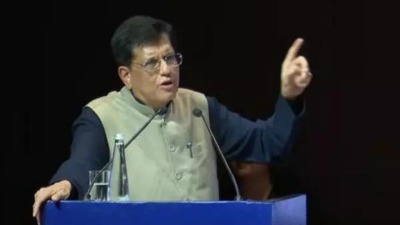NEW DELHI: Union commerce minister Piyush Goyal on Friday said that India would “never negotiate at gunpoint” after US President Donald Trump hit a 90-day pause period on tariff imposition on countries including India.
“Trade talks proceed when both sides are sensitive to each other’s concerns and requirements. All our trade talks are progressing well, in the spirit of India First, and to ensure our pathway to Viksit Bharat @ 2047 in the Amrit Kaal,” Goyal said speaking on the sidelines of the Italy-India business, science and technology forum.
“We never negotiate at gunpoint. Favourable time constraints motivate us for quicker talks, but till the time we are not able to secure the interest of our country and our people, we do not hurry,” he added.
Follow live updates
Donald Trump had, on Wednesday, announced a 90-day pause period on tariff imposition including 26% on India, except China.
“Conversely, and based on the fact that more than 75 Countries have called Representatives of the United States, including the Departments of Commerce, Treasury, and the USTR, to negotiate a solution to the subjects being discussed relative to Trade, Trade Barriers, Tariffs, Currency Manipulation, and Non Monetary Tariffs, and that these Countries have not, at my strong suggestion, retaliated in any way, shape, or form against the United States, I have authorized a 90 day PAUSE, and a substantially lowered Reciprocal Tariff during this period, of 10%, also effective immediately. Thank you for your attention to this matter!” Trump had declared.
“Based on the lack of respect that China has shown to the World’s Markets, I am hereby raising the Tariff charged to China by the United States of America to 125%, effective immediately. At some point, hopefully in the near future, China will realize that the days of ripping off the USA., and other Countries, is no longer sustainable or acceptable,” he said, exempting China from the pause period.
Also read: Xi Jinping warns of ‘self-isolation’ in first response to Trump tariffs, calls on EU to resist US ‘bullying’
Meanwhile, external affairs minister S Jaishankar remarked that India’s trade negotiations were quite complex, noting that the United States had high expectations and the global environment has changed significantly compared to a year ago.
“This time around, we are certainly geared up for a very high degree of urgency. I mean, we see a window. We want to see stuff. So our trade deals are really challenging. And we are really, when I look at the trade deals, I mean it’s not my direct credit, but we have a lot to do with each other. I mean, these are people very much on top of their game, very ambitious about what they want to achieve,” he said.
“We talked for four years during the first Trump administration. They have their view of us, and frankly, we have our view of them. The bottom line is that they didn’t get that. So if you look at the EU, often people say we’ve been negotiating for 30 years, which is not entirely true because we had big blocks of time and nobody was even talking to each other. But they have tended to be very protracted processes,” he added.
India is taking a measured approach to the matter, with the government actively pursuing the US-India trade agreement that was announced during Prime Minister Narendra Modi’s visit to the United States earlier this year. While the 26% tariff imposed on India is higher than what many experts expected, it remains lower than the rates imposed on other countries. For instance, China initially faced a combined tariff of 54% (20% plus a 34% discount), which has now been raised to 125% following its retaliatory actions.


